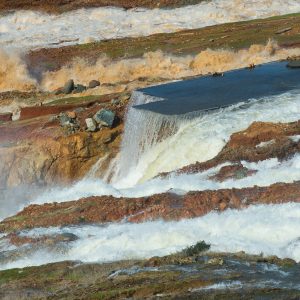The Stream, February 16: Syria Flood Risks Rise Amid Fighting
The Global Rundown
The United Nations warned there is a high risk of floods downstream of the Tabqa Dam in Syria, which is controlled by Islamic State militants. Researchers in Georgia conducted a cyberattack on a simulated water treatment plant, revealing the vulnerability of water infrastructure. The European Commission said it will take Ireland to court over inadequate sewage treatment that is polluting waterways. Australia announced financial support for a major solar energy project that could include pumped hydro storage. Russia proposed tax breaks for aging oil fields that are producing much more water than crude. Government sources said the Trump administration will soon issue a series of executive orders for the U.S. Environmental Protection Agency.
“As per local experts, any further rise of the water level would submerge huge swathes of agricultural land along the river and could potentially damage the Tabqa Dam, which would have catastrophic humanitarian implications in all areas downstream.” –Excerpt from a United Nations report warning that extensive flooding could occur along the Euphrates River. Fighting in Syria has damaged some dams, and militants continue to manipulate water flows. (Reuters)
By The Numbers
38 cities Number in Ireland that have inadequate sewage treatment, resulting in the pollution of rivers and coastal waters. The European Commission is pursuing a court case to force the country to comply with wastewater regulations. Irish Times
$54 million Amount Australia’s government will loan to a large-scale solar energy project in Queensland, which includes plans for a 250-megawatt pumped hydro storage system. Guardian
95 barrels of water Amount produced for every 5 barrels of crude oil pumped from the Samotlor oil field, the largest in Russia. The Russian government is considering tax cuts for aging, inefficient oil fields to ensure continued production. Bloomberg
In context: Learn how California disposes of “produced water” — the chemical- and salt-laced liquid byproduct found in the same deep geologic zones that contain oil and natural gas.
Science, Studies, And Reports
Infrastructure controls that are connected to the internet are vulnerable to ransomware, putting water and energy supplies at risk, according to researchers at the Georgia Institute of Technology. In a simulation, researchers showed how a system could be hacked to make drinking water unsafe without alerting any sensors. CSO
In context: Learn how the water industry prepares for cyberattacks.
On The Radar
The administration of U.S. President Donald Trump is preparing a series of executive orders that will affect the Environmental Protection Agency, according to anonymous sources present at an agency meeting. No details were given about the content of the orders, but an announcement is expected after Scott Pruitt, Trump’s nominee for EPA administrator, is confirmed later this week. Reuters
A news correspondent for Circle of Blue based out of Hawaii. She writes The Stream, Circle of Blue’s daily digest of international water news trends. Her interests include food security, ecology and the Great Lakes.
Contact Codi Kozacek





